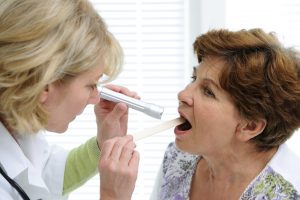 New findings suggest that a saliva gland test may better diagnose early Parkinson’s disease. Researchers from the Mayo Clinic and Banner Sun Health Research Institute found that testing a portion of a person’s submandibular gland could spot early Parkinson’s disease.
New findings suggest that a saliva gland test may better diagnose early Parkinson’s disease. Researchers from the Mayo Clinic and Banner Sun Health Research Institute found that testing a portion of a person’s submandibular gland could spot early Parkinson’s disease.
There is no current accurate testing method for Parkinson’s disease, and so saliva gland testing may offer the accuracy doctors need for the diagnosis. To complete the test, a needle is inserted into the submandibular gland, which is located beneath the jaw, and is used to withdraw necessary tissue from the core of the gland. A protein found in Parkinson’s disease patients is then compared to those being tested to determine if it is present in them or not.
Advertisement
Study author Charles Adler said, “This is the first study demonstrating the value of testing a portion of the submandibular gland to diagnose a living person with early Parkinson’s disease. Making a better diagnosis in living patients is a big step forward in our effort to understand and better treat patients.”
The study involved 25 patients with Parkinson’s disease for less than five years, and 10 control patients. Biopsies from the saliva gland were taken and analyzed for Parkinson’s disease proteins.
Coauthor Thomas Beach added, “This procedure will provide a much more accurate diagnosis of Parkinson’s disease than what is now available. One of the greatest potential impacts of this finding is on clinical trials, as at the present time some patients entered into Parkinson’s clinical trials do not necessarily have Parkinson’s disease, and this is a big impediment to testing new therapies.”
Abnormal Parkinson’s disease proteins were uncovered in 14 of the 19 patients who had enough tissue to be studied. Dr. Adler added, “This study provides the first direct evidence for the use of submandibular gland biopsies as a diagnostic test for living patients with early Parkinson’s disease. This finding, in patients with early Parkinson’s disease, may be of great use, since accuracy of diagnosis in patients with early disease is not nearly as good as in those having the disease for more than 10 years.”
Current diagnosis of Parkinson’s disease is conducted through medical history, observation of symptoms, ruling out other conditions, and neurological examinations. Further testing will be required before saliva testing can be ruled out as an effective means to diagnose Parkinson’s disease.
Sources:
http://www.eurekalert.org/pub_releases/2016-02/mc-sds020116.php
